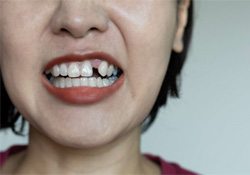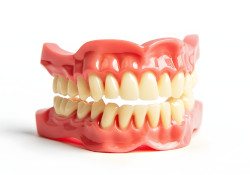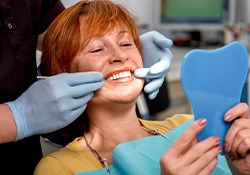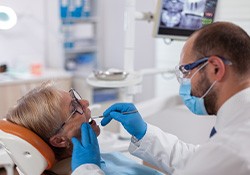Dentures – Fort Mill, SC
Get Your Smile Back

If you’ve struggled with tooth loss in the past, you know how difficult it can be to complete daily tasks,, like chewing your food, speaking clearly, and smiling without feeling insecure. The good news is that you don’t need to spend the rest of your life with gaps in your smile. We offer dentures in Fort Mill so you can get your smile back! To learn more about dentures or to schedule a consultation with us, give us a call .
Why Choose Southlake Family Dentistry for Dentures?
- Customized for Each Patient
- Flexible Financing Available
- Dental Membership Plan
Who’s a Good Candidate for Dentures

A good candidate for dentures can be someone who is missing several, most of, or all of their teeth. Depending on the number of teeth that are missing and where they are located in the mouth, we can create a customized treatment plan just for you. However, your smile must be in good health before we move forward with this process. If you have oral health issues, this will need to be addressed before we can continue with the procedure. After all, the health of your smile is our number one priority!
Effects of Missing Teeth

It’s important to know what can cause someone to lose their teeth as well as the consequences of not replacing them in time. Some of the most common reasons involve gum disease, tooth decay, physical injury, and poor oral hygiene habits. Certain systemic conditions can also play a role in losing teeth over time.
Those who’ve lost their pearly whites know all too well the disadvantages of their smile. Not only will you feel less confident about your appearance, but you’ll also experience difficulties with various daily tasks, such as eating, talking, and smiling. Without tooth roots, your jawbone will also begin to deteriorate due to a lack of stimulation, resulting in problems like dental shifting, gum recession, and facial sagging.
What Qualifies You for Dentures?

As mentioned before, most people who are missing any number of teeth can be eligible for dentures. With this versatile method, we can personalize your prosthetics to fit perfectly with the rest of your smile for many years. However, you’ll need to have sufficient jawbone density and healthy gums before undergoing the treatment.
When it comes to the type of denture you’ll receive, we’ll need to consider the number of teeth that require replacements. Our options include full dentures, partial dentures, and even implant dentures. These custom prosthetics also come with a lower initial price, making them popular for patients working with a budget.
Alternative Tooth-Replacement Options

If dentures aren’t on the table for you, it doesn’t mean you’ll be all out of options. Our team offers other solutions for restoring your bite, such as:
- Dental Bridges : If you’re missing one or just a few teeth in a row, then dental bridges are a perfect option. As long as you have healthy adjacent teeth, we can support your prosthetic on them to keep them stable.
- Dental Implants : For superiority stability, we can embed titanium posts into your jawbone to directly anchor your restoration(s) to your facial structure. This process requires sufficient bone density and involves minor surgery. However, the results can easily last decades to a lifetime with proper maintenance.
Types of Dentures

There are a few different types of dentures to cater to your needs. After we thoroughly examine your smile, we will be able to tell you which of the following is ideal for you.
Partial Dentures
A partial denture is an excellent option for those who still have some healthy teeth in their mouth. A partial denture fits between the teeth like a puzzle piece, so you can replace missing teeth in different areas of the mouth with one restoration per arch.
Full Dentures
If you are missing all of the teeth on one or both of your arches, a full denture is likely a great option for you. Instead of being held in place by your existing teeth, a full denture is kept stationary by the shape and suction of the gums.
Implant Dentures
If you’re searching for a more stable, permanent option, implant dentures could be the solution for you. This type of denture is anchored into the jawbone with titanium, screw-like implants that are surgically placed to act as tooth roots. They allow for additional bite force and prevent bone loss from occurring over time.
How Dentures Are Made

When choosing dentures to replace your missing teeth, you may begin to wonder how these custom prosthetics are created to fit comfortably and correctly inside your mouth. With the careful hand of a trusted lab technician and high-resolution imaging of your gums and bite, your new teeth go through a rigorous process before reaching their final destination. Read to discover how dentures are made so that you can better appreciate them once they’re in place.
What Are Dentures Made Of?

Two components make up a denture – the base and the artificial teeth. Here is a brief overview of each:
- Denture Base: Commonly made out of acrylic, a denture base can also be crafted from resin, nylon, porcelain, or metal. Its purpose is to support the artificial teeth that are attached to create a new and natural-looking smile. By using acrylic, the material can be color-matched so that it looks just like normal gum tissue.
- Artificial Teeth: Attached to the base of your denture, these teeth are most commonly crafted out of resin or porcelain because of how they can mimic the look of natural tooth enamel. Porcelain tends to be more popular, though, as it even feels like enamel, and it’s highly durable.
The Denture Creation Process

Creating a set of dentures requires time and patience. Lab technicians spend years learning how to properly complete this process, so to ensure that your new set of teeth fit properly and look completely natural, you must accept the time it can take to produce them.
As a multi-step process, our team will begin by taking an impression of your upper and lower gums. This will help in the creation of a plaster mold that will replicate your mouth. We will also measure your jaw for a proper fit.
Once it is sent to a dental laboratory, they will create a wax mold of your gumline before placing artificial teeth onto the base with a mechanical articulator. The technician will carve away any excess wax and shape it to look like your gums.
The next step is for the lab to send us the wax dentures so that we can perform a fitting. If you and our team approve of the dentures, we will send them back to the lab so they can be completed. During this time, you’ll wear temporary dentures so that your mouth can adjust to the new objects inside your mouth.
A lab technician will then boil the dentures to remove wax areas before placing the teeth in a flask and filling it with plaster. This will hold the shape of the dentures before the flask is placed in hot water to melt the dentures.
They will create holes in the teeth so that the new material will attach, and a liquid separate is added to keep the acrylic from sticking. Lab technicians will then inject acrylic into the flask to replace the wax. After removing all the plaster, the acrylic dentures are given an ultrasonic bath to make sure all remaining plaster is gone.
They’ll remove excess acrylic before giving your new teeth a final polish. The last step is to send them back to our office so that a final fitting is achieved. If adjustments are required, we can make them at this time.
Adjusting to Your New Dentures

Minimal discomfort is normal after receiving your dentures. Some mild soreness is normal, especially as you learn to eat and speak with your new teeth. This is why you’ll need to be patient so that your gums, tongue, bone, and remaining oral structures become more familiar with your new teeth. You can hurry up the adjustment phase by eating soft foods, trying a denture adhesive, practicing mouth exercises, and speaking slowly to avoid slurring your words.
The Benefits of Dentures

As you might know, being without teeth tends to make life a struggle. Even simple habits like eating, speaking, and smiling become hard without a full smile. The good news is that our practice’s quality dentures are life-changing for patients with missing teeth. By wearing them, you’ll see a major boost to your overall quality of life. To learn more about the benefits of dentures, please keep reading or call our office soon.
Psychological Benefits

People with tooth loss often see a decline in their mental health. It’s a natural response, after all – knowing you lack teeth can prompt self-esteem issues and depression. Thankfully, our dentures would help you avoid low moods by filling your smile’s gaps. That means you could feel more confident, feeling assured you won’t show a broken smile to your friends or family! You wouldn’t need to worry about your looks, speech, and so on.
Clearer Enunciation

Since you need teeth to enunciate words, losing them makes talking hard. Missing just one or two can result in problems like slurred speech, severe lisps, and more. Still, dentures would address your enunciation issue by replacing your missing teeth. They can support your tongue enough to form words, allowing you to speak fairly clearly. Just keep in mind that you’ll have to practice with them first; learning to talk with dentures takes time.
Improves Nutrition

As it happens, prolonged tooth loss leads to a poor diet. You need strong teeth to chew most foods, so losing them will restrict your meal choices; that effect leads to malnutrition and indigestion. That said, dentures solve this dilemma with their artificial teeth. Once you start wearing them, they’ll help you chew a wider range of food than you could otherwise. The result will be a higher degree of nutritional health.
Preserves Oral Health

The longer it goes untreated, the more tooth loss damages your oral health. Smile gaps will tilt your remaining teeth over time, serve as breeding grounds for harmful bacteria, and erode your jaw. Even so, dentures would prevent those effects by filling the awful spaces. You could trust them to slow down the tilting of other teeth and reduce the spread of bad microbes. Similarly, dentures would keep your jaw from eroding as much as before.
Expands Opportunities

When you lose teeth, you lose something crucial to a good first impression: a pretty smile. The long-term effect of that is to miss positive social opportunities – friendships, romances, etc. With dentures, though, you could restore your smile and regain the chance to make good impressions. Their prosthetic teeth look lifelike and natural, such that the treatment enhances your looks. You’d then get to enjoy a whole slew of great opportunities in life.
Understanding the Cost of Dentures

Rather than commit to dentures too early, you’ll want to learn their price first. Doing so should help you see whether treatment fits your budget. That said, the cost of dentures varies from patient to patient; you’ll need to see our dentists for an estimate. Our team will also strive to make your care affordable, walking you through cost factors, dental insurance, and more. Learn other relevant details by reading below or call us soon!
Factors That Affect the Cost of Dentures

Various factors can affect your dentures’ cost, including:
- Preparatory Services – You may need dental work prior to your denture treatment, ranging from tooth removal to gum disease therapy. You’ll have to pay more if that’s the case.
- Denture’s Base Materials – While most denture bases use acrylic, this material can come in different kinds. The type used for your own device can make your treatment cost high or low.
- Replacement Teeth Materials – A denture’s artificial teeth are either acrylic or porcelain. In general, acrylic kinds are less expensive, and porcelain ones are more expensive.
Besides these three factors, remember that lower-priced dentures use poor materials. You’d do well to buy moderately priced ones to ensure better treatment quality.
Are Implant Dentures More Expensive?

While implant dentures have a higher upfront price than normal ones, the cost is justified. These special restorations offer benefits you won’t find anywhere else.
Don’t forget that implant dentures use dental implant implants – metal posts set in your jaw. Because these posts fuse with one’s jawbone, they keep your new teeth from slipping or falling. That means your final restoration should remain secure and steady for many years! Such a result is priceless, especially since implant dentures are also lifelike.
At the same time, implant dentures are wise investments. Their long lifespans – reaching 30 years or more with proper care – keep them from needing much repair work. As a result, they’ll help you save money otherwise spent on follow-up dental visits.
Does Dental Insurance Cover Dentures?

The good news is that dental insurance often does cover dentures. Most plans see these replacement teeth as crucial, so they’ll match 50% of a denture’s cost. Patients usually just need to meet their deductible or maximum first.
On the other hand, there are exceptions to these rules. Your own dental plan could have limited denture coverage or none at all. Therefore, please confirm your policy’s benefits before you commit to treatment; our office will help you do so.
Other Options for Making Dentures Affordable

Dentures can be affordable even without dental insurance. To make them more budget-friendly, simply rely on our practice’s helpful payment options! We at Southlake Family Dentistry offer services like:
- Dental Membership Plan – If you pay an annual fee, you can join our office’s dental membership plan. Doing so gives patients a major discount on dentures and other treatments.
- Flexible Financing Program – Southlake Family Dentistry is proud to work with CareCredit, a reputable 3rd party financier. They’d allow you to pay for dentures in small monthly installments!
Quality replacement teeth like dentures shouldn’t “break the bank.” To keep that from happening, see us and learn how to finance your treatment!
